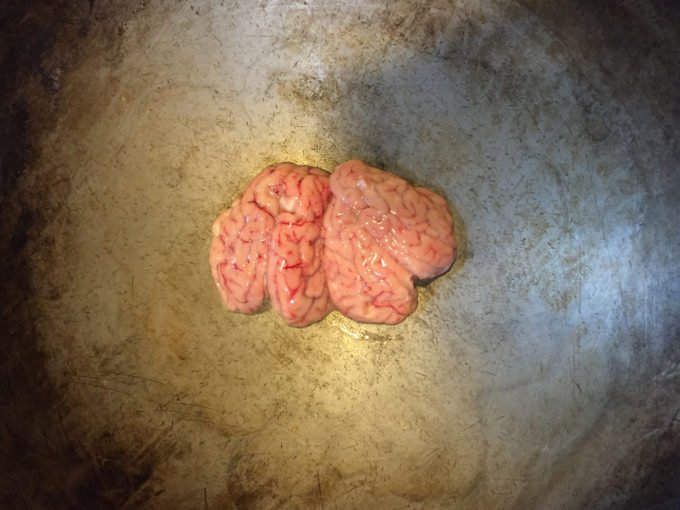
In All Fairness, Chicken Would Not Have Been Much of a Distraction Anyway

In All Fairness, Chicken Would Not Have Been Much of a Distraction Anyway
Brains Breakfast-Style in Karachi
My father liked to tell us this story when we were children: a fellow doctor was visiting some exotic country (I forget where) and was invited to a dinner. His hosts placed a monkey’s head before him—brains, eyeballs and all—and told him, “It is our tradition to serve our guest of honor this delicacy.” The young doctor’s stomach quaked. All eyes—including the monkey’s—were on him. “Where I am from, it is a tradition to honor your hosts by asking them to eat such a delicacy first,” he replied. As the story goes, the hosts were overjoyed, everyone felt suitably honored, and the dinner was a success.
We were taught to eat—and loudly appreciate—whatever a host put on our plates. There were two rules we had to abide by. The first was simple: don’t insult someone by refusing the food or drink they offer you. The second was trickier: eat the food, yes. Finish it? Certainly not. For instance, if you were given a glass of juice at someone’s house, you were to make sure you drank all but the last few gulps, leaving an inch or so of juice in the glass. “Gobble everything down and people will think you don’t get good food in your own home,” we were warned. “You don’t want people to think you are a bhooki (perpetually hungry or just plain greedy).”
I’m 30 now, but these rules have remained with me. Pakistanis can be unfailingly generous, especially when they do not have the means to be so. Cups of milky tea with a sheet of crinkled malai on top, full glasses of lassi, skinny tangles of ghevar (like jalebis, but sweeter) served deep-fried on newspapers, plates of Shinwari tikka and grilled mutton chops: these are just a few of the offerings made by those I’ve met in my work as a reporter. It doesn’t matter that I don’t drink tea or the mutton chops left my (vegetarian until then) colleague with a heaving stomach well into the next day. The rules still apply.
Last week I interviewed Tariq, who learned to cook from his father more than 50 years ago. After we were done chatting, he insisted on cooking for me. “Brains,” he said. “Tell me how you like them done.” Maghaz, or brains, don’t come cheap—at most supermarkets, an apple-sized goat’s brain will cost 130 rupees ($1.23)—and brain masala is the dish you serve at an Eid breakfast or a brunch, the calorie- and cholesterol-soaked treat in a decadent morning meal. At Tariq’s café, brain masala costs 380 rupees ($3.60), but restaurants in Karachi usually charge between 500-850 rupees ($4.74-$8.06). “Brains with heart and kidneys, brains with chops, brains with chicken, brains in nihari or brains breakfast-style?” Tariq prompted. I had never eaten brains. I paused.
Tariq made the call: breakfast-style means the brain will be the star and I wouldn’t be distracted by anything else on the plate. No chicken, no mutton nihari, just brains. He tipped two pink, heart-shaped brains into a wok and blanched them until a white foam bubbled up. “The fat,” Tariq pointed out. A tikki—a serving of butter the size of my fist—went into the wok, and Tariq smeared the tikki’s waxed paper wrap against the wok’s sides, the heat lifting off any leftover streaks of butter. A red masala paste, tomatoes, onions, green peppers, ginger, and garlic followed. The key to a good brain masala is consistency. The maghaz must be creamy, but textured like crème caramel that hasn’t fully set, Tariq explained to me. “I’ll leave it chunky for you,” he said as he gently nudged the simmering brains. They fell apart.
Tariq ladled the maghaz and its brown fish curry-smelling juices into a plate, and handed it to me with a stack of paper-thin rotis. “Eat up,” he said, smiling. “Its so good, I know you’ll wipe your plate clean.”